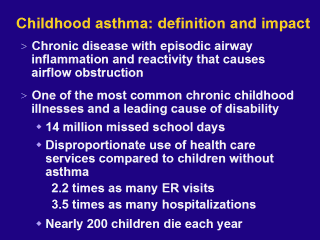| front |1 |2 |3 |4 |5 |6 |7 |8 |9 |10 |11 |12 |13 |14 |15 |16 |17 |18 |19 |20 |21 |review |
 |
Asthma is a chronic
respiratory disease that causes episodic symptoms or "attacks." The airways
carrying air to and from the lungs become inflamed, and the tiny muscles
surrounding the airways become abnormally reactive and contract. The result
is narrowed airways that make it difficult to breathe. Attacks usually occur
with exposure to triggers that include airway irritants such as allergens,
tobacco smoke and air pollution, and also other triggers such as infections,
exercise, and changes in the weather. Asthma symptoms can include wheezing,
coughing, shortness of breath, and chest pain and can range from mild to
life threatening.
Asthma has become a focus of clinical research and public health programs because it is one of the most common chronic childhood diseases. It results in increased health care utilization, high health care costs, and indirect costs such as missed school days and missed work days for caretakers. Rarely, it can also lead to premature death. Most poor outcomes from asthma, such as hospitalization and death, are theoretically preventable. (For more information on the burden of childhood asthma, see references 1-3) |